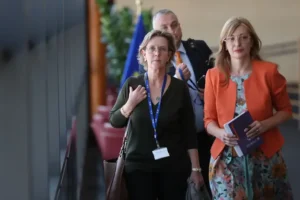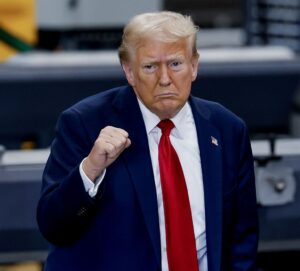“Washington not interested in Europe’s proposal for zero-for-zero tariffs“
With EU stock markets plunging again today as President Donald Trump imposes a new level of tariffs on China (taking the total to 104%), member states, including Portugal, will be voting on the first phase of Brussels’ response to US tariffs that come into force as of today.
For the time being, the European proposal for ‘a good deal’ by abolishing tariffs between the two trading blocs has been viewed with disinterest by Washington, explains SIC and thus today Brussels is expected to announce retaliation in the form of a 25% tax on various products imported from the US.
A full list has yet to be published, but media sources cite “eggs, dental floss, sausages, poultry, meat and diamonds (…) The same applies to steel and aluminium” over which the Trump administration has already imposed levies.
This first round of European tariffs would also come into force at the beginning of next week and is expected to affect more than €21 billion worth of US exports to EU countries.
For now bourbon has been left off the list after a 50% tax was initially proposed, which France and Italy rejected, “fearing that Trump would further attack European wines” – which account for roughly €112 million-worth of exports from Portugal.
The US president threatened to slap a 200% counter-tariff on European alcoholic drinks if the European Union included bourbon on its retaliatory list.
Today, in Portugal, talks are still ongoing with business leaders and associations, as the caretaker government tries to reach a consensus on what the various sectors feel they need, in terms of support, while the ultimate strategy is being left in Brussels’ hands. The Council of Ministers, however, will discuss the issues of possible national response tomorrow, on the basis of the meetings that have been taking place.
PS leader Pedro Nuno Santos, intent on persuading voters to vote PS in the upcoming elections on May 18, has been telling reporters that, in his opinion, the government has not acted swiftly enough.
“The tariffs will have an impact on some of our industries, namely textiles and footwear, but also indirectly on our automotive components industry. And so what we needed was a government that would react more quickly, as the Spanish government has,” he said today.
Considering the Government’s lack of action as being “clear to everyone”, Santos said that, since the announcement of these tariffs, the only thing that has happened are the meetings with business associations.
“What we needed was proposals to be presented, namely to support our export industry in directing part of its exports to other markets”, he said, defending support for the “intensification and diversification of the markets of exporting companies”.
According to the PS leader, “this would imply a reallocation of some community funds”, and negotiation work with Brussels, which in his opinion again, “should have already begun”.
“And we must also have other support measures for our companies, such as public credit insurance to help our companies enter markets that are still unknown to them,” he added.
The tariffs, which the US President calls “reciprocal”, come into effect today, and are a tax that is in addition to the global minimum tariff of 10% that came into effect on April 5.
Source: SIC Notícias/ Lusa




















